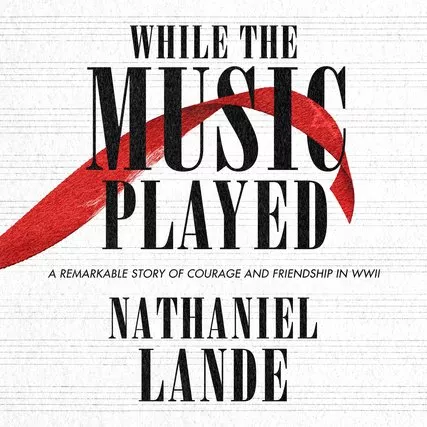While the music played
Published on 5th March 2021

Highly worthy of its place on the 2021 Dublin Literary Award Longlist, this début novel by Canadian author Nathaniel Lande (nominated by the Hungarian Katona József Library of Bács-Kiskun County), is a notable addition to the Holocaust fiction canon. Spanning the period 1939 to 1945, it tells the story of the persecution of the Jewish community and the Resistance movement in the occupied former Czechoslovakia. Narrated through the eyes of young Czech Max Mueller (a gifted musician and budding journalist) it is also a poignant coming of age story as he moves from boyhood to a young man of eighteen.
As with many recent novels in this genre, While the music played is based on meticulous research; Lande spent 8 months in Terezin (a Czech town 30 miles outside Prague, where the Nazis set up a Jewish ghetto and transit concentration camp to Auschwitz which they named Thereisenstadt), Berlin and London, speaking to survivors and others. What raises this novel to the next level though, is the combination of the author’s academic background and professional credentials; Lande’s doctoral thesis was on the subject of Politics and Propaganda in World War II, in the course of which he became interested in Terezin. He is also already an established, prolific non-fiction author, as well as a journalist and film maker. This ensures that the novel, while at times making liberal use of poetic licence, is both beautifully written and historically highly credible.
While moving between the capital cities of Prague, Berlin and London, the story it is primarily set in Terezin. Lande manages to seamlessly merge a complex range of narratives, and skilfully blends real historical characters with fictional ones. These include Winston Churchill, the high-ranking German SS official Reinhard Heydrich, and prominent Thereseinstadt inmates, among whom were the acclaimed Czech Jewish composer Hans Krase and the Jewish physician and psychologist Viktor Frankl (author of Man’s search for meaning).
The story follows Max and his Jewish friends (all gifted musicians) who inevitably are deported to Thereseinstadt, and their subsequent daily struggle for survival. Thereisenstadt is well known for its use as a Nazi propaganda tool to fool the visiting International Red Cross team into believing conditions for Jewish inmates were very favourable. Less widely known perhaps are the many performances, by Jewish children, of the famous children’s opera, Brundibár, written by the aforementioned Hans Krase.
For me, what makes this novel special is that it is the first in-depth fictional treatment of the Thereseinstadt concentration camp that I have come across and it provides a brilliant insight into how daily life in Terezin played out for the hapless Jewish inmates.
Underscoring the narrative throughout is the theme of the extraordinary power of music and literature in helping mankind transcend and overcome the very worst of times; the crucial role of objective journalism in countering toxic propaganda and upholding democracy is also very cleverly interwoven in the narrative. As an avid reader of this genre, this one is a standout and well worth a read.
Access eBooks/eAudiobooks on your phone, tablet or reader. Once you have installed the app, search for Dublin in the ‘Library’ field provided and then sign in using your library membership card number and PIN. Watch our how to video on Borrowbox. Members of other library authorities will need to log in using a different link.
Submitted by Evelyn from Reader Services.